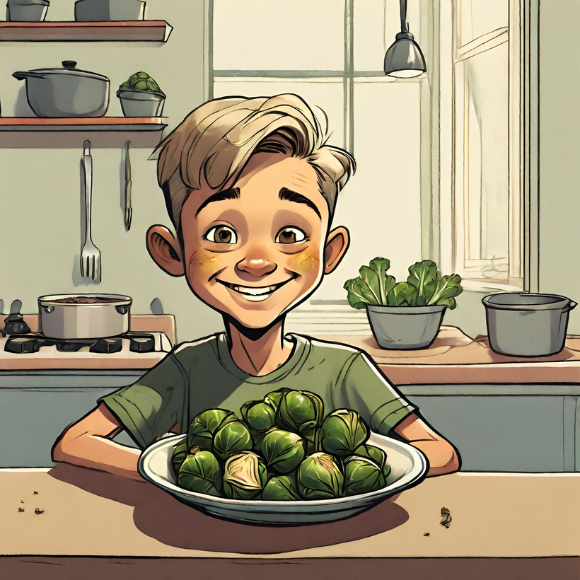Read by Michael Flamel

Heavens to Betsy! Eat your Brussels sprouts!” my mother would demand. “You don’t want to fall behind other kids while growing up, do you?” The implication was that not eating the green vegetables kids make sour faces at could stunt your growth! And she meant physical growth. No siree, I didn’t want to be the puny kid, afraid to take off my shirt when playing shirts vs. skins.
But the green globs on my plate never tasted very good. Back in those days, especially off-season, getting green veggies meant frozen or canned—almost never fresh for much of the year. Now you can get many fruits and vegetables all year long in almost any local grocery store.
Which brings me to Brussels sprouts—one of the most dreaded of the green vegetables for any child.
If all I had to go on was childhood memories of Brussels sprouts, I’d never have one anywhere near my mouth for the rest of my life. Except that I learned how to cook them myself (never boil them!) and have now grown to love these little balls of deliciousness.
Besides being delicious (when prepared properly), Brussels sprouts are packed with vitamins and other compounds that contribute to a healthier you. At their most basic, Brussels sprouts are packed with fiber, so they’re a good meal choice if you’re a little, shall we say, irregular. But there’s more health power in Brussels sprouts than you could ever imagine!
Heart Health from the Green Orbs
Heart disease, including heart attacks and strokes, is the number one cause of death in the United States. Brussels sprouts are packed with vitamin C, which is linked to lower risks for cardiovascular disease.
High-blood pressure usually accompanies heart disease. Brussels sprouts have 7% of your daily recommended allowance of potassium, which may reduce the amount of sodium your body absorbs.
Now a word of caution for anyone who takes blood thinners. Brussels sprouts are also rich in vitamin K, which helps your blood clot. If you take blood thinners, too many Brussels sprouts could interfere with your medication. So, always check with your doctor.
Fighting Cancer with Brussels Sprouts
A compound present in Brussels sprouts and other cruciferous vegetables has been linked to blocking enzymes that interfere with tumor suppressing treatments. Researchers think that the compound, indole-3-carbinol, may help keep cancerous tumors from growing.
Another study found that the antioxidants in Brussels sprouts could protect against damage to cells that could lead to cancer. And yet another study found that eating Brussels sprouts could increase the level of helpful enzymes in the body.
Reduce Inflammation by Eating Healthful Brussels Sprouts
The anti-inflammatory compounds in Brussels sprouts protect cells from damage and may help improve inflammatory diseases, including rheumatoid arthritis, Type 2 diabetes, obesity, and inflammatory bowel disease.
Full of antioxidants, Brussels sprouts help snag free radicals before they can do more damage to your cells. And researchers have found that the sulfur compounds in Brussels sprouts are beneficial for your digestive system, preventing bacteria from clinging to the stomach wall.
Fight Cataracts and Protect Your Skin with Brussels Sprouts
The vitamin C in Brussels sprouts does extra duty to help keep you healthy. Vitamin C is essential to good eye health and helps reduce the risk of cataracts. The antioxidant power of vitamin C can help protect your skin cells against damage from pollution and the sun. And vitamin C is part of the collagen production process, to help keep your skin smooth and supple.
Bottom Line about Healthful Brussels Sprouts
While there will certainly be more studies about the health benefits of Brussels sprouts, you can be confident now that a side dish of sprouts is not only delicious, but beneficial for your health in a wide variety of ways. And when those Brussels sprouts are home-grown? That’s the healthy way to go! So, what are you waiting for? Give growing Brussels sprouts a try and enjoy this healthful green vegetable—your mother is always right!
Did you know that Brussels sprouts can be so healthful? Please tell us about ways you prepare Brussels sprouts by commenting below—share a recipe or a cooking tip or trick. ❖


 Previous
Previous



There is an incident etched forever in my mind from my childhood. I didn’t like Brussels Sprouts, didn’t even like the smell of them. Mum prepared them as she did most vegetables, by boiling them until they were mush. On this occasion, I was refusing, once again to eat them. My mum actually mashed them into my mashed potatoes and said I was not allowed to leave the table until they had been eaten. I sat there, complaining bitterly for an age, but she wouldn’t give in. In the end, I had to eat cold, congealed mashed potato and brussels, gagging on every bite. To this day (I am now in my late 60s) I have never again eaten brussels sprouts. Even having read the article, and the many good things I have heard about them, I just don’t know if I could ever make myself eat them.